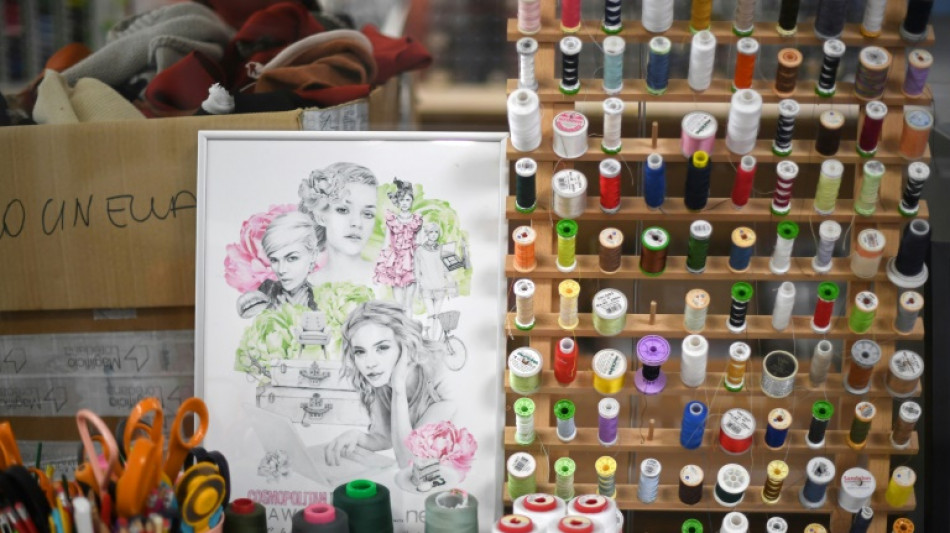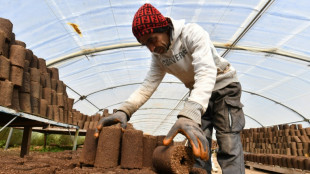
-
 Saka 'ready to go' after long injury lay-off: Arteta
Saka 'ready to go' after long injury lay-off: Arteta
-
Ingebrigtsen Sr, on trial for abusing Olympic champion, says he was 'overly protective'

-
 Tourists and locals enjoy 'ephemeral' Tokyo cherry blossoms
Tourists and locals enjoy 'ephemeral' Tokyo cherry blossoms
-
Khamenei warns of 'strong' response if Iran attacked

-
 France fines Apple 150 million euros over privacy feature
France fines Apple 150 million euros over privacy feature
-
UK PM urges nations to smash migrant smuggling gangs 'once and for all'

-
 Thai authorities probe collapse at quake-hit construction site
Thai authorities probe collapse at quake-hit construction site
-
France's Le Pen convicted in fake jobs trial

-
 Chinese tech giant Huawei says profits fell 28% last year
Chinese tech giant Huawei says profits fell 28% last year
-
Trump says confident of TikTok deal before deadline

-
 Myanmar declares week of mourning as hopes fade for quake survivors
Myanmar declares week of mourning as hopes fade for quake survivors
-
Japan's Nikkei leads hefty market losses, gold hits record

-
 Tears in Taiwan for relatives hit by Myanmar quake
Tears in Taiwan for relatives hit by Myanmar quake
-
Venezuela says US revoked transnational oil, gas company licenses

-
 'Devastated': Relatives await news from Bangkok building collapse
'Devastated': Relatives await news from Bangkok building collapse
-
Arsenal, Tottenham to play pre-season North London derby in Hong Kong

-
 Japan's Nikkei leads hefty equity market losses; gold hits record
Japan's Nikkei leads hefty equity market losses; gold hits record
-
Israel's Netanyahu picks new security chief, defying legal challenge

-
 Trump says US tariffs to hit 'all countries'
Trump says US tariffs to hit 'all countries'
-
Prayers and tears for Eid in quake-hit Mandalay

-
 After flops, movie industry targets fresh start at CinemaCon
After flops, movie industry targets fresh start at CinemaCon
-
Tsunoda targets podium finish in Japan after 'unreal' Red Bull move

-
 French chefs await new Michelin guide
French chefs await new Michelin guide
-
UK imposes travel permit on Europeans from Wednesday

-
 At his academy, Romanian legend Hagi shapes future champions
At his academy, Romanian legend Hagi shapes future champions
-
Referee's lunch break saved Miami winner Mensik from early exit

-
 Djokovic refuses to discuss eye ailment after shock Miami loss
Djokovic refuses to discuss eye ailment after shock Miami loss
-
Mitchell magic as Cavs bag 60th win, Pistons and T'Wolves brawl

-
 Mensik shocks Djokovic to win Miami Open
Mensik shocks Djokovic to win Miami Open
-
Duterte lawyer: 'compelling' grounds to throw case out

-
 What happens on Trump's 'Liberation Day' and beyond?
What happens on Trump's 'Liberation Day' and beyond?
-
Clock ticks on Trump's reciprocal tariffs as countries seek reprieve

-
 Japan-Australia flagship hydrogen project stumbles
Japan-Australia flagship hydrogen project stumbles
-
Musk deploys wealth in bid to swing Wisconsin court vote

-
 Mensik upsets Djokovic to win Miami Open
Mensik upsets Djokovic to win Miami Open
-
China manufacturing activity grows at highest rate in a year

-
 'Waited for death': Ex-detainees recount horrors of Sudan's RSF prisons
'Waited for death': Ex-detainees recount horrors of Sudan's RSF prisons
-
Japan's Nikkei leads big losses in Asian markets as gold hits record

-
 Rescue hopes fading three days after deadly Myanmar quake
Rescue hopes fading three days after deadly Myanmar quake
-
'Basketbrawl' as seven ejected in Pistons-Wolves clash

-
 Four men loom large in Microsoft history
Four men loom large in Microsoft history
-
Computer pioneer Microsoft turns 50 in the age of AI

-
 Trump calls out both Putin and Zelensky over ceasefire talks
Trump calls out both Putin and Zelensky over ceasefire talks
-
Kim Hyo-joo tops Vu in playoff to win LPGA Ford Championship

-
 Economy and especially Trump: Canadians' thoughts on campaigns
Economy and especially Trump: Canadians' thoughts on campaigns
-
Liberal PM Carney takes lead four weeks before Canada vote

-
 SpaceX to launch private astronauts on first crewed polar orbit
SpaceX to launch private astronauts on first crewed polar orbit
-
Australia open door for Kerr's return as Matildas captain

-
 The Premier League's unlikely pretenders to Champions League riches
The Premier League's unlikely pretenders to Champions League riches
-
IFabric Corp Reports Record Q4 and Full Year 2024 Revenues and Strong Profitability


Fast-fashion fallout: young people in UK spurred into sewing
From jogging outfits to summer dresses, Lea Baecker has stitched together most of her wardrobe herself from inside her London flat, part of a burgeoning number of young amateur seamstresses.
Like many others in the growing horde of sew-it-yourself enthusiasts, she has grown increasingly disillusioned with the retail clothing industry, viewing it as too destructive.
"My main motivation was not having to buy ready-to-wear clothes anymore because I didn't want to support fast fashion," Baecker, 29, told AFP, referring to clothes made and sold cheaply to be thrown away after minimal use.
The doctoral student in neuroscience only started sewing in 2018, beginning with small bags before moving on to clothes.
Four years on, she estimates about 80 percent of clothes in her wardrobe are homemade, from pyjamas to long fleece coats, as well as jeans made with denim scraps scalped from relatives.
Baecker now buys new clothes "very rarely", she added, wearing one of her self-made long, hand-sewn dresses.
- 'Scale' -
The fashion and textile industry is the third most polluting sector globally after food and construction, accounting for up to 5 percent of greenhouse gas emissions, according to a 2021 report by the World Economic Forum.
Low-cost fashion retailers are regularly criticised for their waste and pollution, as well as the pay conditions imposed on their workers.
Tara Viggo knows fast fashion only too well, having worked in the industry for 15 years as a pattern maker.
"I realised the scale that the fashion industry was working at and it was a bit terrifying," she told AFP.
In 2017, Viggo decided to start creating her own patterns -- the blueprint drawings on paper before garments are made.
She started out small, selling only around one set of patterns per year, a far cry from the four a day that she would sometimes churn out in the ready-to-wear industry.
Viggo conceded independent operators like her were only tiny competitors to the big brands, but insisted they still could have a meaningful impact.
"The more of us that do (it), the better," she said.
"It's like a trigger... People start to look at where their consumption" is, she added noting it also made you aware of the true costs involved.
"Once you know how to sew your own clothes, you can't fathom that a shirt should be £3 ($4.10, 3.60 euros) anymore."
- 'More young people' -
Viggo's "Zadie" jumpsuit is now a top seller on "The Fold Line", an online platform selling independently produced sewing patterns, according to its co-founder Rachel Walker.
Since its launch in 2015, the website has grown from about 20 designers to more than 150 today.
Rosie Scott and Hannah Silvani, who run a London workshop selling fabrics from fashion designers' unsold stock, have also seen the resurgence in sewing's popularity, particularly among young people.
"The clients have changed," said Scott.
"More young people have shown interest in sewing -- young people who are really interested in making their own clothes and making them sustainably."
Women make up more than 90 percent of the clientele, she also noted.
Customers can choose from some 700 designer fabrics, sold from £8 a metre for cotton voile -- a sheer, lightweight cotton fabric -- to £110 for the same length of lace.
Orders soared during the pandemic and are still going strong despite the lifting of restrictions, Scott said.
- Instagram key -
The sector's explosive growth would not have been possible without Instagram, where the sewing community has made a pastime once seen as unfashionable much more trendy.
The photo-sharing platform "is really important", Baecker said, allowing sewists to post images of their designs and engage with each other.
This is what prompted her to join the social network, where she now regularly shares her latest works.
"I found each pattern has a specific hashtag that you can look up and then you can see a lot of different people wearing the same pattern and you can imagine how it can look on yourself," she explained.
For example, Viggo's #Zadiejumpsuit -- which comes in velvet or cotton, with or without sleeves -- has been tagged in almost 11,000 posts.
Meanwhile, the hashtag #handmadewardrobe features in more than 900,000 posts.
With Baecker sharing so many of her creations, she has also inspired friends to join the growing sewing revolution.
"That is my proudest achievement... getting my friends into sewing as well," she said.
Ch.Kahalev--AMWN

